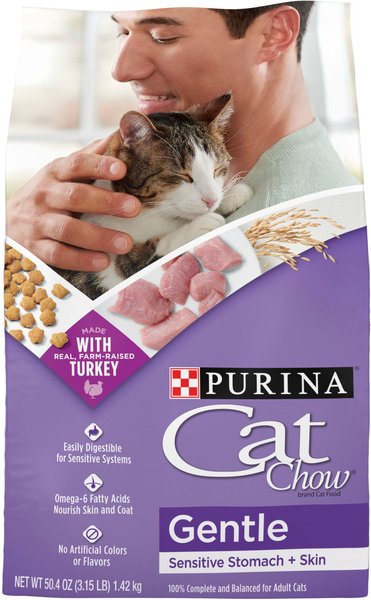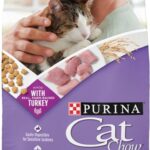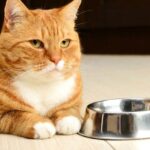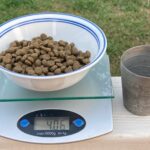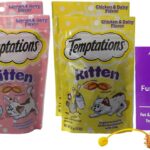Cat food for sensitive stomachs should be highly digestible and made with limited ingredients. It usually includes probiotics or prebiotics to aid digestion.
Choosing the right cat food for a sensitive stomach is crucial for your feline’s health and comfort. Cats with digestive issues require a specialized diet formulated to ease gastrointestinal distress. Such foods are typically crafted with simple, high-quality proteins and are free from common irritants like artificial colors and flavors.
They often incorporate essential vitamins and minerals tailored to support a healthy gut. A sensitive stomach recipe might feature novel proteins or hydrolyzed ingredients to minimize the risk of allergic reactions. Pet owners must also ensure the diet is balanced to meet all of a cat’s nutritional needs while preventing further stomach upsets. Consulting with a veterinarian can help in selecting an appropriate product that aligns with your cat’s specific requirements.
Signs Your Cat Has A Sensitive Stomach
Every cat owner knows the joy of a contented purr and the worry when something just isn’t right with their feline friend. A sensitive stomach can be quite distressing for your cat and can be a sign of deeper health issues. If you’re worried your cat might have a finicky stomach, understanding the signs can help you intervene with the right dietary changes or a trip to the vet before it becomes a bigger issue. Here’s what you need to keep an eye out for:
Recurring Digestive Upset
Consistent gastrointestinal disturbances are a tell-tale sign your cat might have a sensitive stomach. These issues often manifest as frequent vomiting, diarrhea, or constipation. Unlike occasional hairballs or the odd upset tummy, a sensitive stomach will cause these symptoms to appear more regularly. A cat’s diet is the main iceberg in these recurring outbreaks and requires your attention to their daily intake.
Symptoms To Watch For
- Occasional Vomiting: While indeed not uncommon for cats, if vomiting occurs multiple times a week, it could be a red flag.
- Lethargy: A cat with a sensitive stomach may display a decrease in activity.
- Poor Appetite: A sensitive stomach often causes cats to eat less or show disinterest in food.
- Weight Loss: Due to the poor appetite caused by stomach sensitivity, weight loss is a common symptom.
- Changes in Stool: Look for changes in consistency, such as diarrhea or hard, dry stools.
These symptoms can become quite concerning when they lead to more adverse conditions like dehydration or nutritional deficiencies. Take the time to observe your cat and note any symptoms that seem out of the ordinary.
When To Consult A Vet
Should you notice consistent signs of digestive problems, it’s crucial to seek professional medical advice. A vet can perform tests to rule out illnesses and give dietary recommendations. It’s particularly important to consult a vet if your cat:
- Has been vomiting or has had diarrhea for more than 24 hours.
- Shows signs of abdominal pain or discomfort.
- Appears lethargic and uninterested in play or interaction for an extended period.
- Exhibits any sudden, unaccounted for weight loss.
Taking prompt action is key to keeping your cat happy, healthy, and purring. Whether it’s a dietary change or treatment for an underlying condition, a vet can guide you through the steps to provide the best care for your cat’s sensitive stomach.
Understanding Sensitive Feline Tummies
When your feline friend starts turning their nose up at dinner time or shows signs of digestive discomfort, it’s a clear indicator that something might not be quite right with their stomach. Sensitivities in cats can be as much of a hassle for them as they are for us, and understanding the root of these can help manage your pet’s health effectively. A sensitive stomach can arise from a variety of causes, and it’s essential to explore the common reasons, how their diet plays a role, and pinpoint any potential allergens or irritants. Let’s delve into the world of sensitive feline tummies and help you pave the way for a happier, healthier kitty.
Common causes of sensitivitiesCommon Causes Of Sensitivities
Just like us, cats can have a range of digestive sensitivities that affect their quality of life. Understanding these helps to provide them with better care.
- Food allergies – Cats can develop allergies to proteins commonly found in pet food.
- Inflammatory bowel disease – A chronic condition affecting many cats, causing an upset stomach among other symptoms.
- Intestinal parasites – These unwelcome guests can disrupt your cat’s stomach health.
- Stress – A less obvious culprit, stress can impact your cat’s digestive system.
How Diet Affects Stomach Health
The importance of diet cannot be overstated when it comes to managing a sensitive stomach. The right nourishment serves as the foundation of your pet’s health.
- High-quality ingredients are crucial for a well-functioning digestive system.
- Fiber content helps with digestive regularity and stool quality.
- Probiotics included in the diet can aid the balance of healthy bacteria in the gut.
- Easily digestible formulas ensure that cats can absorb the nutrients without irritation.
Identifying Allergens And Irritants
Identifying what irritates your cat’s stomach is key to managing their sensitivities. An elimination diet can be a useful tool in determining the cause.
| Step | Action | Outcome |
|---|---|---|
| 1. | Eliminate all potential allergens from the diet. | Baseline established for stomach health. |
| 2. | Gradually reintroduce single ingredients. | Identification of specific allergens or irritants. |
| 3. | Consult a veterinarian. | Professional diagnosis and tailored diet plan. |
Selecting Cat Food For Sensitive Stomachs
When our feline friends suffer from a sensitive stomach, finding the right food for them is not just a matter of choice, but a question of their health and comfort. Sensitive digestion can lead to a myriad of issues, ranging from vomiting to diarrhea. Therefore, selecting the appropriate diet tailored to their unique needs becomes imperative for their well-being.
Importance Of Quality Ingredients
The foundation of good health for any cat, especially those with a delicate digestive system, starts with high-quality ingredients. The key is to look for cat food that features whole proteins as the first ingredient, such as chicken, fish, or turkey, avoiding by-products and fillers that can exacerbate stomach upset. Organic or free-range sources constitute premium options, ensuring your pet receives nourishment free from unwanted chemicals or antibiotics.
Including essential vitamins and minerals in their diet enhances overall digestive health. A well-balanced formula that includes taurine, omega fatty acids, and antioxidants supports not just the stomach, but also heart health and immune function.
The Role Of Probiotics And Fiber
Probiotics are beneficial bacteria that aid digestion and maintain intestinal health. The inclusion of these microorganisms can be crucial for cats with sensitive stomachs. Look for cat foods that list probiotics like Lactobacillus or Bifidobacterium among their ingredients. Similarly, fiber plays a pivotal role in regulating digestion. A blend of soluble and insoluble fibers helps to normalize bowel movements and can work to firm up loose stools.
Wet Vs Dry Food Considerations
Choosing between wet and dry food involves assessing your cat’s specific needs. Wet food, with its higher moisture content, is beneficial for cats who might not drink sufficient water and can ease digestion. It typically contains fewer carbohydrates and more proteins, aligning well with a cat’s carnivorous nature. On the other hand, dry food offers convenience and is often enriched with dental benefits, reducing tartar buildup through the mechanical action of chewing.
For those with sensitive stomachs, a wet food diet might be preferable. However, consulting with a veterinarian can lead to a tailored feeding regime that may include a mix of both wet and dry foods to optimize your cat’s digestive health.
Top Soothing Picks For Affected Felines
Cats with sensitive stomachs need special care and attention, especially when it comes to their diet. Choosing the right cat food that’s not only nourishing but also gentle on the digestive system is crucial for their overall well-being and happiness. In this guide, we explore a range of top picks meticulously crafted to provide soothing comfort to your affected felines without compromising on nutritional value.
Recommendations for gentle formulasRecommendations For Gentle Formulas
Finding a cat food that’s both appetizing for your pet and gentle on their stomach can be a challenge. Here are hand-picked options that balance flavor with a delicate composition, perfect for cats prone to digestive upset:
- Hydrolyzed Protein Diets – Designed to be easily digestible and reduce the chance of allergic reactions.
- Limited Ingredient Foods – Contain fewer components to minimize the risk of ingredient sensitivity.
- Probiotic-Enriched Formulas – Feature beneficial bacteria to support a healthy gut flora.
- Prebiotic Fibers – Aid in maintaining intestinal health and solid stools.
Specially Formulated Sensitive Stomach Blends
Some cats require a diet specifically tailored to the needs of a sensitive stomach. These blends are crafted to reduce gastrointestinal discomfort and encourage easy digestion:
| Brand | Key Features |
|---|---|
| Brand A Digestive Care | Rich in easily digestible proteins and carbohydrates, with added digestive enzymes |
| Brand B Stomach Health | Includes novel proteins to decrease sensitivity, plus antioxidants to support immunity |
Organic And Holistic Options
To ensure your cat’s food is free from artificial additives and pesticides, you might want to consider organic and holistic cat foods. These foods are crafted with high-quality ingredients to promote digestive health:
- Certified Organic Brands – Guarantee the exclusion of synthetic fertilizers and hormones, assuring a natural diet for your feline friend.
- Homemade Diet Preparations – Allow complete control over ingredients, ensuring your cat receives a balanced and reassuring meal.
- Holistic Veterinarian-Formulated Diets – Combine modern science with traditional wisdom to create a harmonious blend optimal for sensitive stomachs.
Transitioning To New Digestive-friendly Diets
When your feline friend suffers from a sensitive stomach, every meal can be a potential battleground for their digestive system. Transitioning to new digestive-friendly diets is paramount to alleviate their discomfort and improve their overall health. The switch to a more suitable diet can not only soothe their stomach but also ensure they get the essential nutrients needed for a healthy life. This careful transition demands patience, keen observation, and adjustments tailored to your cat’s unique dietary needs.
Gradual Changeover Importance
Making a sudden change in diet can further upset your cat’s stomach. It’s critical to introduce new foods slowly, blending them with the old diet in increasing amounts. This gradual changeover helps the digestive system to adjust to the new formula without causing additional stress. The process typically spans over a week or more, reducing the risk of rejection or gastrointestinal upset.
Monitoring Your Cat’s Reaction
Each cat is an individual, and their reaction to diet changes can vary greatly. Close monitoring during the diet transition is essential. Look for signs of improved digestion or any adverse effects. Regular observations will guide you in determining if the new diet suits your pet or if further changes are needed. Keep an eye out for changes in stool consistency, frequency, and behavior, as these can be the first indicators of how well the new food is being tolerated.
Frequency And Portion Size Adjustments
For cats with sensitive stomachs, how much and how often they eat can be just as important as what they eat. Smaller, more frequent meals can prevent the stomach from becoming overloaded and facilitate easier digestion. Adjust the portion size to accommodate your cat’s size, age, and activity level, and establish a feeding schedule to provide consistency. This regularity helps stabilize the digestive system and reduce stomach sensitivity over time.
Tailoring Diet To Your Cat’s Needs
Ensuring your feline friend has the right diet is fundamental to their health, especially if they have a sensitive stomach. Cats with digestive issues require special attention to their nutrition. Different cats have different needs. Some may thrive on commercial cat foods specifically designed for sensitivity, while others might need a more customized approach, such as a homemade meal plan. It’s crucial to exactly balance their diet to prevent or manage stomach issues effectively.
Balancing Commercial And Homemade Meals
For many cat owners, striking a perfect balance between commercial and homemade food can be quite challenging. Here’s how to align these options for your cat’s diet:
- Understand the Nutritional Needs: Acknowledge the essential nutrients required in a cat’s diet, such as protein, fats, carbohydrates, vitamins, and minerals.
- Quality over Quantity: Select high-quality commercial foods that are rich in nutrients, and incorporate homemade meals slowly, ensuring you don’t upset your cat’s stomach.
- Consult with a Vet: Always liaise with a vet to design homemade meal plans that complement commercial foods and meet your cat’s specific dietary requirements.
When To Go For Hypoallergenic Diets
Choosing a hypoallergenic diet should be considered under these circumstances:
- Noticeable Symptoms: If your cat exhibits symptoms like chronic diarrhea, vomiting, or skin irritations, a hypoallergenic diet may be necessary.
- After Allergy Testing: Post-diagnosis with a vet’s allergy tests can confirm if a hypoallergenic diet will benefit your cat.
- Protein Specificity: Some cats may be sensitive to certain proteins. Hypoallergenic foods often utilize novel or hydrolyzed proteins to minimize allergic reactions.
The Necessity Of Ongoing Dietary Evaluations
Regular dietary assessments are non-negotiable for cats with sensitive stomachs. Keep these pointers in mind:
- Monitor Changes: Observe your cat’s response to their diet and note any changes in health and behavior.
- Veterinary Check-ups: Scheduled visits to the vet are essential to ensure the diet is still suitable and to make adjustments as needed.
- Be Patient: Dietary transitions should be gradual to avoid upsetting your cat’s stomach.
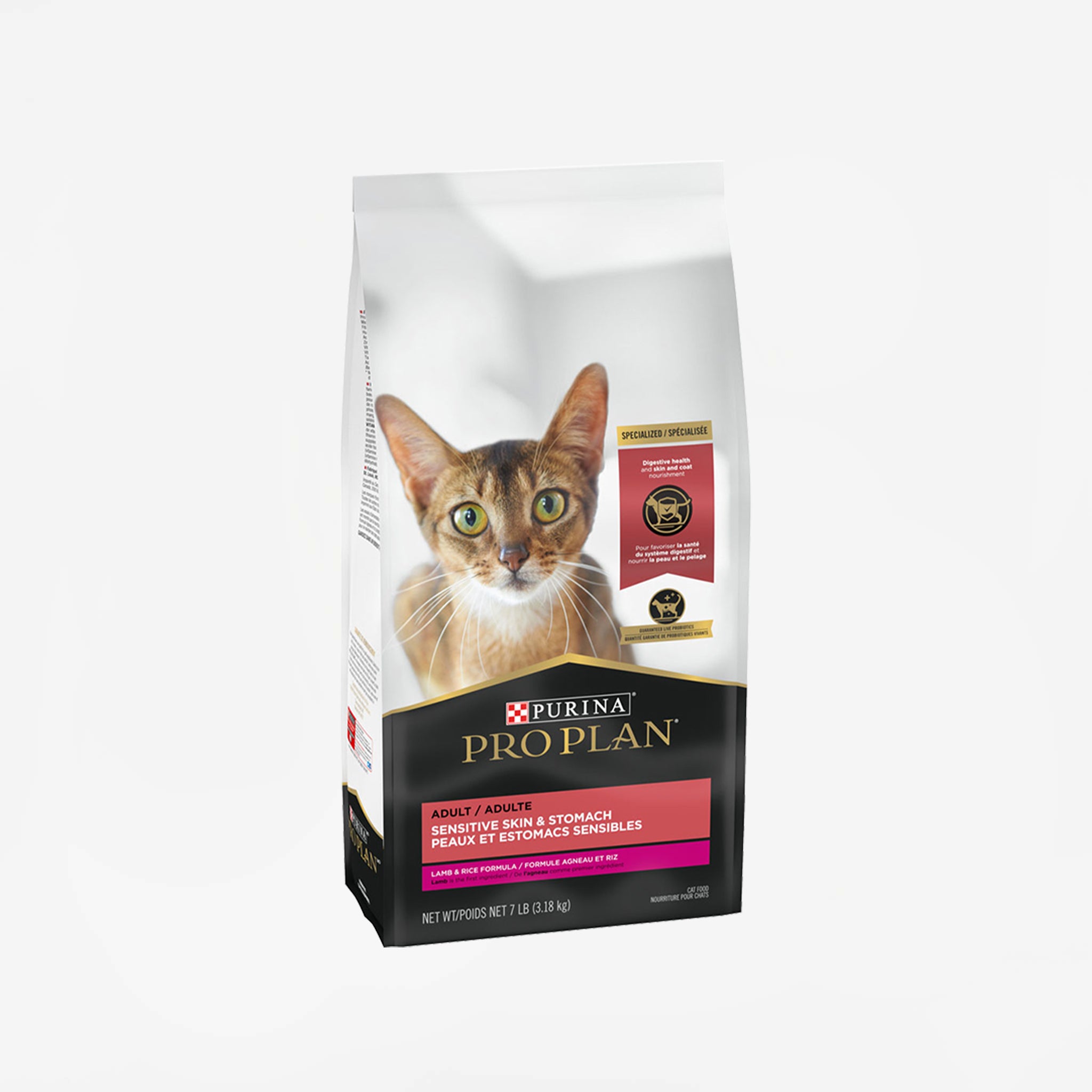
Credit: www.dutch.com
Frequently Asked Questions For Cat Food For Sensitive Stomach
What Causes Sensitive Stomachs In Cats?
A sensitive stomach in cats can be caused by various factors. These include dietary intolerances, food allergies, rapid diet changes, and underlying health issues. Identifying the specific cause is crucial for proper management.
How To Choose Cat Food For Sensitive Stomachs?
Selecting cat food for sensitive stomachs requires looking for easily digestible ingredients. Preferably, choose hypoallergenic foods or those with limited ingredients. Also, consult with your vet for personalized recommendations.
Can Changing Cat Food Improve Digestion?
Yes, gradually switching to a specially formulated sensitive stomach cat food can improve digestion. It allows the cat’s digestive system to adapt and may resolve stomach sensitivities.
What Ingredients Should I Avoid In Cat Food?
Avoid ingredients that commonly irritate a cat’s stomach, such as artificial colors, preservatives, fillers, or high-lactose dairy products. Opt for natural, simple, and high-quality ingredients instead.
Conclusion
Navigating the journey to find the right cat food for sensitive stomachs can be challenging. Yet, with the insights shared here, that task is now easier. Remember, choosing a diet that’s gentle on your feline friend’s digestion is crucial. Embrace the guidance, explore high-quality options, and watch your pet thrive.
Your cat’s health and happiness depend on it.
